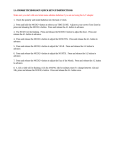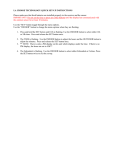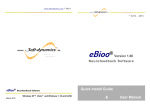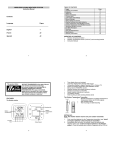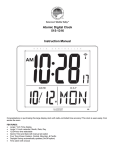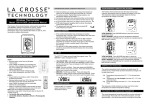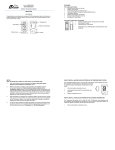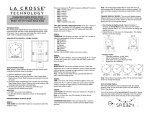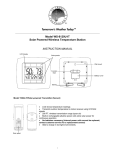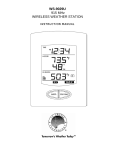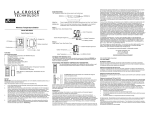Download Model WS-6010U Solar Station QUICK SETUP GUIDE Solar
Transcript
Model WS-6010U Solar Station QUICK SETUP GUIDE Wall Mount Location Solar panel Battery compartment Solar-powered Transmitter: Remote transmission of outdoor temperature and humidity to the Solar Station by 915 MHz signals LCD will automatically alternate and display the outdoor temperature and humidity data Recharge batteries by solar-powered cells Wall mounting case Notes: 1 Solar panel The solar-powered temperature transmitter uses solar cells to charge the rechargeable batteries (2 x AAA rechargeable batteries; included). The rechargeable batteries cannot be replaced. SOLAR TRANSMITTER OPERATION MODES Important: Users need to press the reset key to activate the solar transmitter and link the transmission to the Solar Station (receiver). It is important to allow sufficient light to reach the solar panel while activating the solar transmitter. Make sure the lights are on in the setup room and the solar panel is facing a 60W light bulb or brighter - do not cover with hands or other objects. Solar transmitter RESET key: RESET key Note: only use a small pointed pen to press the RESET key to re-active the transmitter into Normal Operation Mode. The solar transmitter has 3 operations modes: Normal Operation Mode: This mode occurs when the battery voltage is higher than 2.5V. The transmitter will measure and transmit the temperature and humidity data to the Solar Station every 8 seconds. The environment brightness is checked every 5 seconds If a dark environment is detected, it will measure and transmit the temperature every 16s. If the battery voltage is dropped lower than 2.8V, it will measure and transmit the temperature every 16s If battery voltage is dropped lower than 2.4V, will go into Idle mode. 2 If the solar transmitter is placed into a dark environment for 72 hours, will goes into Stop mode. If the user cover the solar cell for 10 seconds and press the reset button, "StP" will be displayed on the LCD. Then the transmitter enters STOP mode. Idle Operation Mode: This mode occurs when the battery voltage drops lower than 2.4V. LCD is turned off. Does not perform temperature measurement and transmission. The environment brightness is checked every 5 seconds. If battery voltage is raised higher than 2.5V, the unit will go into Normal mode. If the solar transmitter is placed into a dark environment for 72 hours, the will go into Stop mode. Stop Operation Mode: This mode occurs when the solar transmitter is placed into a dark environment for 72 hours or the user covers the solar cell for 10 seconds and presses the RESET button. The transmitter is in a standby state. The does not perform any operations and the LCD is off. Under a bright condition, press the reset button to wake up the transmitter into normal operation mode (battery voltage is higher than 2.5V). This is the most power saving mode. TO INSTALL / REPLACE BATTERY IN THE SOLAR STATION The Solar Station can use either the included 2 x alkaline rechargeable batteries (charged by solar panel; included) or 2 x AA alkaline battery (non-rechargeable; not included). INITIAL SETUP It is very important to follow these steps: 1. First, remove the label covering over the battery compartment on the back. 3 2. Open the battery compartment, and MAKE SURE that the battery switch is in the BATTERY position (not the SOLAR position). 3. 4. 5. 6. Now locate the battery insulator tab, and gently pull to remove it. Slide the battery switch to the SOLAR position Battery switch in the SOLAR position Continue to section titled “Setup After Changing/Installing the Battery in the Solar Station” Battery switch in the BATTERY position TO INSTALL / REPLACE BATTERIES The included alkaline rechargeable batteries should provide you with many years of service. If your batteries need to be replaced, we suggest you use 2 fully charged the AA Alkaline. Rechargeable batteries should be fully charged before inserting into clock. Alkaline rechargeable batteries must be used. If you choose to use non-rechargeable batteries, the battery switch MUST be moved to the BATTERY position (not the SOLAR position). In this position, the solar cells do not charge the batteries. REGARDLESS OF THE TYPE OF BATTERIES INSTALLED, THE BATTERY SWITCH MUST BE IN THE BATTERY POSITION WHEN THE BATTERIES ARE INSERTED. If rechargeable batteries are used, the Battery switch should be moved to the SOLAR position AFTER it is has been inserted. To use non-rechargeable alkaline batteries: 1. Remove the included rechargeable AA batteries from the compartment. 2. Use the switch to select the alkaline battery (see below). 3. Insert the batteries into the compartment, observing the correct polarity (see marking inside battery compartment. 4. Replace battery cover 4 Note: For best performance, batteries should be replaced at least once every 2 years to maintain the best running accuracy. Ensure that the batteries used are new and the correct size. Use switch to select which type of battery will be used before inserting the battery into the compartment 5 Primary Alkaline battery switch position Rechargeable Alkaline battery switch position Please help in the preservation of the environment and return used batteries to an authorized depot. SETUP AFTER CHANGING/REPLACING THE BATTERY IN THE SOLAR STATION 1. 2. 3. After powering up the Solar Station, all LCD segments will light up briefly and it will show the time (12:00), indoor temperature, date, and indoor humidity. After the batteries are inserted, the Solar Station will start receiving data signal from the solar transmitter. The outdoor temperature and humidity data should then be displayed on the solar station. If this does not happen after 2 minutes, the batteries will need to be removed from both units and reset from step 1. The distance between the Solar Station and the transmitter should not be more than 200 feet (60.96m) to ensure sufficient 915 MHz transmission. (see notes on “Positioning” and “915 MHz Reception”). Note: When changing the batteries: 1. Be careful that they do not spring free from the contacts. 2. Press any button 20 times with the batteries removed. 3. Always wait at least 10 minutes after removing batteries before re-inserting; otherwise start up problems may occur. TO SET THE TIME Note: The time will be displayed with “AM” or “PM” for the time from 12:00 noon until 11:59. 1. Press and hold the SET key for 3 seconds to enter the time setting mode. 6 2. 3. 4. 5. 6. The hour digits will start flashing. Set the desired hours by pressing and releasing the + key followed by pressing the SET key. Now the minute digits will start flashing. Set the desired minutes by pressing and releasing the + key. If the + key is held, the units will increase by 5. Press the SET key again to confirm and enter the Solar Mode setting. SOLAR MODE The Solar Mode is used for saving the power consumption of the rechargeable battery (Default setting ON): 1. 2. The characters “ON” or “OFF” will start flashing. By use of the + key select “ON” or “OFF” to set the solar mode. Press and release the SET key to exit the setting mode and switch back to the normal display mode. If the solar mode setting is ON: The surrounding environment brightness is checked every 5 seconds. LCD will automatically turn OFF if the environment is too dark. LCD will automatically turn ON if the environment is bright enough. No information will be displayed when the LCD is OFF, but all the settings and operations will remain, except for the temperature and humidity measurements. If the solar mode setting is OFF: LCD will remain ON constantly. STOP MODE If the Solar Station is placed in a dark environment for 72 hours continually, the clock will go to the stop mode: The most power saving condition. 7 The Solar Station will not perform any operation and the LCD will also be OFF. Press any key to wake up the Solar Station and to re-activate the transmission with the solar transmitter. MIN/MAX: Press and release the PLUS button to view: Outdoor Temperature minimum and maximum. Indoor temperature minimum and maximum. Current display. RESET MIN/MAX: Press and hold the PLUS button for 10 seconds to reset the indoor and outdoor minimum and maximum temperatures to current temperatures. DISPLAY MODES: Press and release the SET button to view Shows outdoor temperature in the first line on the left side and outdoor humidity in the second line on the left side. Shows indoor temperature in the first line on the right side and indoor humidity in the second line on the right. Shows outdoor temperature in the first line on the left side and outdoor humidity in the first line on the right side. Shows indoor temperature in the second line on the left side and indoor humidity in the second line on the right side. Shows indoor temperature in the first line on the left side and indoor humidity in the first line on the right side. Shows outdoor temperature in the second line on the left side and outdoor humidity in the second line on the right side 8 915MHZ RECEPTION CHECK FOR OUTDOOR SOLAR TRANSMITTER The Solar Station will receive the outdoor data every 48 seconds. If the temperature data is not being received 2 minutes after setting up (or the display shows “- - -”), then please check the following points: 1. The distance of the Solar Station or outdoor transmitter should be at least 6 feet (2 meters) away from any interfering sources such as computer monitors or TV sets. 2. Avoid placing the receiver onto or in the immediate proximity of metal window frames. 3. Using other electrical products such as headphones or speakers operating on the same signal frequency (915MHz) may prevent correct signal transmission and reception. 4. Neighbors using electrical devices operating on the 915MHz signal frequency can also cause interference. Note: When the 915 MHz signal is received correctly, do not re-open the battery cover of the Solar Station, as the batteries may spring free from the contacts and force a false reset. Should this happen accidentally then reset all units (see “TO INSTALL / REPLACE BATTERY IN THE SOLAR STATION” and “INITIAL SETUP” above) otherwise transmission problems may occur. The maximum transmission range is 200 feet (60.96 m) from the outdoor transmitter to the Solar Station (in open space). However, this depends on the surrounding environment and interference levels. If no reception is possible despite the observation of these factors, all system units have to be reset (see “TO INSTALL / REPLACE BATTERY IN THE SOLAR STATION” and “INITIAL SETUP”). POSITIONING THE SOLAR STATION: Before permanently mounting, ensure that the Solar Station is able to receive 915MHz signals from the desired location. In addition, the Solar Clock should be placed in a bright environment for the rechargeable batteries to be able to recharge. There are two possible ways to mount the solar station: Table Stands Wall Mounting WALL MOUNTING 9 1. 2. Install a mounting screw (not included) into a wall—leaving approximately 3/16 of an inch (5mm) extended from the wall. Place the Solar Station onto the screw, using the hanging hole on the backside. Gently pull the Solar Station down to lock the screw into place. Note: Always ensure that the Solar Station locks onto the screw before releasing. POSITIONING THE SOLAR TRANSMITTER: It is important to place the solar transmitter in a bright environment for the rechargeable batteries to be able to recharge. The solar transmitter can be placed onto any flat surface or wall mounted using the bracket which doubles as a stand or wall mount base. To wall mount: Secure the bracket onto a desired wall using the screws and plastic anchors. Clip the solar transmitter onto the bracket. Note: The mounting surface can affect the transmission range. If, for instance, the unit is attached to a piece of metal, it may then either reduce or increase the transmitting range. For this reason, we recommend not to place the unit on any metal surfaces or in any position where a large metal or highly polished surface is in the immediate vicinity (garage doors, double glazing, etc.). Before securing in place, please ensure that the Solar Station can receive the 915MHz signal from the solar transmitter at the positions that you wish to place them. WARRANTY INFORMATION La Crosse Technology, Ltd provides a 1-year limited warranty on this product against manufacturing defects in materials and workmanship. This limited warranty begins on the original date of purchase, is valid only on products purchased and used in North America and only to the original purchaser of this product. To receive warranty service, the purchaser must contact La Crosse Technology, Ltd for problem determination and service procedures. Warranty service can only be performed by a La Crosse Technology, Ltd authorized service center. The original dated bill of sale must be presented upon request as proof of purchase to La Crosse Technology, Ltd or La Crosse Technology, Ltd’s authorized service center. 10 La Crosse Technology, Ltd will repair or replace this product, at our option and at no charge as stipulated herein, with new or reconditioned parts or products if found to be defective during the limited warranty period specified above. All replaced parts and products become the property of La Crosse Technology, Ltd and must be returned to La Crosse Technology, Ltd. Replacement parts and products assume the remaining original warranty, or ninety (90) days, whichever is longer. La Crosse Technology, Ltd will pay all expenses for labor and materials for all repairs covered by this warranty. If necessary repairs are not covered by this warranty, or if a product is examined which is not in need or repair, you will be charged for the repairs or examination. The owner must pay any shipping charges incurred in getting your La Crosse Technology, Ltd product to a La Crosse Technology, Ltd authorized service center. Your La Crosse Technology, Ltd warranty covers all defects in material and workmanship with the following specified exceptions: (1) damage caused by accident, unreasonable use or neglect (including the lack of reasonable and necessary maintenance); (2) damage occurring during shipment (claims must be presented to the carrier); (3) damage to, or deterioration of, any accessory or decorative surface; (4) damage resulting from failure to follow instructions contained in your owner’s manual; (5) damage resulting from the performance of repairs or alterations by someone other than an authorized La Crosse Technology, Ltd authorized service center; (6) units used for other than home use (7) applications and uses that this product was not intended or (8) the products inability to receive a signal due to any source of interference. This warranty covers only actual defects within the product itself, and does not cover the cost of installation or removal from a fixed installation, normal set-up or adjustments, claims based on misrepresentation by the seller or performance variations resulting from installation-related circumstances. LA CROSSE TECHNOLOGY, LTD WILL NOT ASSUME LIABILITY FOR INCIDENTAL, CONSEQUENTIAL, PUNITIVE, OR OTHER SIMILAR DAMAGES ASSOCIATED WITH THE OPERATION OR MALFUNCTION OF THIS PRODUCT. THIS PRODUCT IS NOT TO BE USED FOR MEDICAL PURPOSES OR FOR PUBLIC INFORMATION. THIS PRODUCT IS NOT A TOY. KEEP OUT OF CHILDREN’S REACH. This warranty gives you specific legal rights. You may also have other rights specific to your State. Some States do no allow the exclusion of consequential or incidental damages therefore the above exclusion of limitation may not apply to you. For warranty work, technical support, or information contact: 11 La Crosse Technology 2817 Losey Blvd. S. La Crosse, WI 54601 The complete instruction manual is available at: www.lacrossetechnology.com/support Le manuel d'instruction complet est disponible sur: www.lacrossetechnology.com / support El manual de instrucciones completo está disponible en: www.lacrossetechnology.com / support All rights reserved. This handbook must not be reproduced in any form, even in excerpts, or duplicated or processed using electronic, mechanical or chemical procedures without written permission of the publisher. This handbook may contain mistakes and printing errors. The information in this handbook is regularly checked and corrections made in the next issue. We accept no liability for technical mistakes or printing errors, or their consequences. All trademarks and patents are acknowledged. 12












